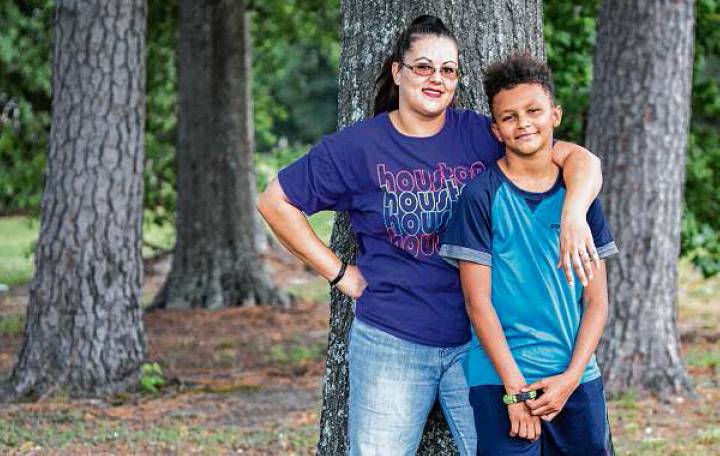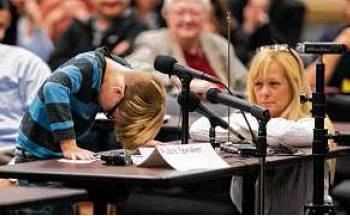DENIED
Fed probe finds TEA violated special ed rules
Report says agency prompted districts to delay or deny services; Abbott wants action plan in 7 days
By Alejandra Matos and Andrea Zelinski
AUSTIN — Nicole Rechner knew this to be true: Texas education officials had denied or delayed special education services to students across the state for more than a decade.
After all, her 13-year-old son, Demarcus Fuller, was one of those students.
But Thursday, Rechner wept when she learned a U.S. Department of Education investigation had determined that Texas Education Agency officials illegally prompted school districts across Texas to delay or deny such services to students by setting an arbitrary cap on them.
“I can say there are some serious flaws in the system because when I need help, I can’t find it,” said Rechner, of Houston.
For more than a decade, TEA judged a school district’s’ performance based in part on the percentage of students receiving special education services. But the benchmark, set at 8.5 percent, had the effect of not providing adequate access to special education resources, the DOE’s Office of Special Education Programs said in a 14-page letter to Texas education officials. Nationally, 13 percent of students receive special education.
Following release of the federal findings, Gov. Greg Abbott ordered state Education Commissioner Mike Morath to develop a corrective action plan within seven days.
Texas education officials kept tens of thousands of children out of special education. Read our series at HoustonChronicle.com/Denied
Steven Aleman, a policy specialist with Disability Rights Texas, said the federal government’s findings come as “no surprise” to parents and advocates.
“Texas students with disabilities who have been ignored and shunned by the special education system have some measure of validation today,” Aleman said. “The Commissioner of Education must immediately embrace the corrective actions required by the U.S. Department of Education and take additional steps, in collaboration with stakeholders, to ensure that all students who were previously denied special education services now rightfully receive compensatory services.”
The report follows a 2016 Houston Chronicle investigation that found tens of thousands of students with disabilities were denied special education services because of the cap. TEA officials have repeatedly said the benchmark was not a cap, but rather an “indicator” of performance. But the federal report confirms districts viewed the enrollment target as a cap.
“While TEA did not specifically direct (districts) to limit the percentage of students identified as children with disabilities, the performance indicator certainly affected district policies and procedures relating to the identification of children with disabilities,” said Kimberly Richey, the department’s acting assistant secretary for special education and rehabilitative services.
The state must now take at least four corrective action steps, but it’s unclear what penalties the state could incur if it does not comply.
TEA eliminated the policy two months after the Chronicle’s investigation. In May, Abbott signed a law prohibiting the use of a performance indicator based solely on the number of students receiving special education services.
“The past dereliction of duty on the part of many school districts to serve our students and the failure of TEA to hold districts accountable are worthy of criticism,” Abbott wrote in his letter to Morath. “TEA must take steps now to significantly increase the oversight provided to ensure our special education students are receiving the services they deserve.”
Morath, a former Dallas ISD trustee appointed two years ago, said in a written statement that he shares Abbott’s urgency to quickly address issues identified in the federal report.
“More importantly, I share the governor’s commitment to doing what’s right for special education students in our public schools,” he said.
The department has added 39 special education staffers across the state in the past year, Morath said.
“I am committing today that there will be more,” Morath said. “The corrective action plan called for by the governor will outline the specific steps TEA will take to address all the identified issues. Parent and special education advocacy group representatives will play an ongoing integral role in helping shape this plan, as well as all efforts of the agency in the years ahead. My top priority has and continues to be to improve outcomes for all students in Texas.”
Struggled to get resources
The federal investigation began in late 2016, after the Chronicle interviewed dozens of teachers, educators and disability rights advocates who said schools had repeatedly denied services to students with dyslexia, autism and other disabilities.
Federal education officials reviewed documents and data, and met with parents and school officials from 12 school districts including Houston, Laredo, Austin and Leander.
The department found the 8.5 percent indicator “contributed to a statewide pattern of practices that demonstrate that TEA did not ensure that all [districts] in the State properly identified, located and evaluated all children with disabilities who were in need of special education and related services,” the department wrote.
Rechner knows firsthand how hard it has been to get her teenage child the services he needs. She first requested a special ed evaluation from Houston Independent School District for Demarcus in 2013, after he was diagnosed with attention deficit hyperactivity disorder.
The district didn’t act.
He didn’t get an evaluation until 2016, after Demarcus told a private psychiatrist that he didn’t want to live anymore and had been diagnosed with depression and anxiety. Even after he was evaluated, he struggled to get the resources he needed, like access to a counselor or a special seat on the school bus.
Eventually, Rechner enrolled Demarcus in a new school, which seemed to work for a while. But in the past six months, she said, he’s been hospitalized twice and arrested, spent Thanksgiving in a juvenile detention facility and has been pushing away his probation counselor.
“I do hope that the changes that are being made — or the things that are being caught — lead to changes being made so that it doesn’t become too late for the next kid,” Rechner said.
The department visited HISD as part of its review. While the report does not mention specific findings regarding Houston ISD, Superintendent Richard Carranza said he is glad the federal government offered clarification. Carranza became HISD’s leader in September 2016.
“We’re just thrilled the US-DOE has issued some guidance to the TEA,” Carranza said. “I know we’re going to work diligently with the TEA to implement corrective actions. There has been work done before the DOE issued this report, and we’ve been working along those lines as well.”
Houston, the largest school district in the state, offered special education resources to 7.26 percent of its students in the 2015-16 school year, the second-lowest rate in the country among urban school districts.
Texas also violated other federal regulations, including the use of alternative programs.
Several school districts in Texas have employed “Response to Intervention” (RTI), an approach that involves addressing learning barriers in a mainstream classroom, rather than through special education programs.
While the DOE allows this approach, schools cannot require teachers to try it before referring a student for special ed.
But the federal agency found schools in Texas were doing just that, saying there is a “general understanding” among educators that students were required to complete RTI before offering special education services.
A ‘measure of validation’
Under the DOE’s order, the state must show that it is monitoring the way in which districts evaluate students suspected of having a disability to ensure schools are providing students a “free appropriate public education,” a tenet of federal special education laws.
Schools must provide special education evaluations to students previously denied services. For students that already receive special ed, educators may need to determine if those students need more academic support.
The state also must submit a plan, including a timeline, for how it will train educators on RTI, the state’s dyslexia program and other special education laws.
U.S. Secretary of Education Betsy DeVos said Thursday she has worked with Morath on resolving special education issues, and appreciates TEA’s efforts “to ensure all children with disabilities are appropriately identified, evaluated and served under IDEA,” the Individuals with Disabilities Education Act.
“Every child with a disability must have appropriate access to special education and related services that meet his or her unique needs,” DeVos said in a written statement. “Far too many students in Texas had been precluded from receiving supports and services under (the act).”
The department did not lay out a specific date for when it expects to see the state’s plan, but Abbott wants it within seven days, as well as recommendations to ensure schools are following special education laws.
“Throughout your tenure, you have advised me of changes taking place at TEA to strengthen and better support special education in Texas,” Abbott wrote Morath. “Through your efforts, much has already been done. However, it is obvious that more can be done, and more must be done.”
Shelby Webb contributed to this report. alejandra.matos@chron.com twitter.com/amatos12andrea.zelinski@chron.com twitter.com/andreazelinski
“Texas students with disabilities who have been ignored and shunned by the special education system have some measure of validation today.”
Steven Aleman, policy specialist with Disability Rights Texas


